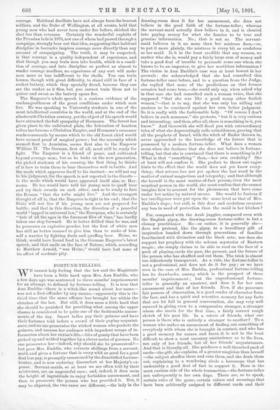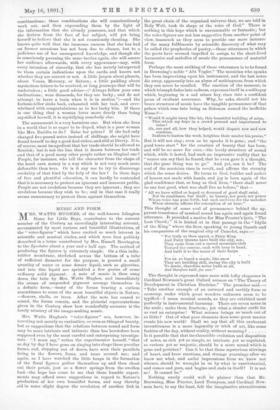FORTUNE -TE LLING.
WE cannot help feeling that the law and the Magistrate have been a little hard upon Mrs. Ann Emblin, who a few days ago was sentenced to three months' imprisonment for an attempt to defraud by fortune-telling. It is true that Ann Emblin—there is a witch-like sound about her name— was not a first-offender by any means,—apparently this is the third time that the same offence has brought her within the clutches of the law. But still, it does seem a little hard that she should be punished for providing what among the upper classes is considered to be quite one of the fashionable amuse- ments of the day. Smart ladies pay their guineas and have their fortunes told before a crowd of their gaping acquaint- ance, and no one prosecutes the wicked woman who pockets the guineas, and amuses her audience with impudent scraps of in- formation about her victim's life,—bits of gossip that have been picked up and welded together by a clever series of guesses. No one prosecutes her—indeed, why should she be prosecuted ?— but poor Mrs. Emblin, who extracts shillings from a servant- maid, and gives a fortune that is every whit as good for a good deal less pay, is promptly summoned by the dissatisfied fortune- hunter, and is now enduring discomfort at her Majesty's ex- pense. Servant-maids, so at least we are often told by their mistresses, are an ungrateful race ; and, indeed, it does seem the height of ingratitude to enjoy forbidden amusement, and then to prosecute the person who has provided it. But, it may be objected, the two cases are different,—the lady in the drawing-room does it for her amusement, she does not believe in the good faith of the fortune-teller; whereas the servant-maid actually does believe in it, and is cheated into paying money for what she fancies to be true and genuine information. No ; that is not so. The servant- maid believes in it no more than her mistress does,—or, to put it more plainly, the mistress is every bit as credulous as her maid. Is it in the least credible that any woman, no matter who she is, would pay a fairly large sum of money and take a good deal of trouble to persuade some one whom she knows to be an impostor, to give her worthless information ? The victim in Ann Emblin's case was at least honest in her avowals : she acknowledged that she had consulted this fortune-teller once before, and to a question from the Judge, she replied that none of the predictions on that former occasion had come true,—she could only say, when asked why in that case she had consulted such a woman twice, that she supposed "that she was like a good many other foolish women,"—that is to say, that she was only too willing and anxious to be convinced against her own better judgment. So it is really with the fashionable lady. " Of course I don't believe in such nonsense," she protests, " but it is very curious and interesting; and then, after all, there is something in it, you know." And therewith she will flood you with extraordinary tales of what she deprecatingly calls coincidences, proving that all the prophets of Israel, with the witch of Endor thrown in, never approached to the knowledge of the future that is possessed by a modern fortune-teller. What does a woman mean when she declares that she does not believe in fortune- telling, but that she is convinced that there is something in it ? What is that " something " then,—her own credulity ? She at least will not confess it. She prefers to throw out vague hints to the effect that the world does not yet know every- thing; that science has not yet spoken the last word in the matter of animal magnetism and telepathy; and that although she herself is the most matter-of-fact person, even the most sceptical person in the world, she must confess that she cannot imagine how to account for the phenomena that have come under her notice by natural means. She would be furious if her intelligence were put upon the same level as that of Mrs. Emblin's dupe; but still, is this dear and credulous creature any less in need of protection than the maid in her kitchen For, compared with the Arab juggler, compared even with the English gipsy, the drawing-room fortune-teller is but a clumsy practitioner. He—or rather, it is generally she— does not pretend, like the gipsy, to a hereditary gift of inspiration handed down through generations of families familiarised with divination and the black arts ; nor does she support her prophecy with the solemn mysteries of Eastern magic ; she simply claims to be able to read on the face of a pack of playing-cards the past, the present, and the future of the person who has shuffled and cut them. The trick is almost too ridiculously transparent. As a rule, the fortune-teller is not a professional, and does not do it for pay ; as we have seen in the case of Mrs. Emblin, professional fortune-telling has its drawbacks, among which is the prospect of three months' imprisonment ; but the unprofessional fortune- teller is generally an amateur, and does it for her own amusement and that of her friends. Now, if she possesses fair powers of observation, is a good reader of character from the face, and has a quick and retentive memory for any facts that are let fall in general conversation, she may very well succeed in giving even to a comparative stranger, a stranger whom she meets for the first time, a fairly correct rough. sketch of his past life. In a coterie of friends, what one person is there who is entirely a stranger to another P To a woman who makes an amusement of finding out something of everybody with whom she is brought in contact, and who has a good memory for names and faces, it is not in the least difficult to show a most uncanny omniscience as to the lives, not only of her friends, but of her friends' acquaintances. And that is literally all. She produces a well-thumbed pack of cards—the gift, she explains, of a greater magician than herself —the subject shuffles them and cuts them, and she deals them out, explaining to a wondering circle a horoscope that has undeniably a good deal of fact to support it. Here is the most curious side of the whole transaction,—the fortune-teller not unfrequently is her own dupe. There are, so to speak, certain rules of the game, certain values and meanings that have been arbitrarily assigned to different cards and their
combinations ; these combinations she will conscientiously work out, and then expounding them by the light of the information that she already possesses, and that which she derives from the face of her subject, will yet bring herself to believe that she is not consciously cheating. She knows quite well that the immense success that she has had on former occasions has not been due to chance, but to a judicious use of her unsuspected knowledge, and though she is consciously pursuing the same tactics again, she will assure her audience afterwards, with every appearance—nay, with every intention of sincerity, that she has merely interpreted to them certain indications upon the cards, and knows not whether they are correct or not. A little jargon about planets, about Venus, Mercury, or Saturn ; a little padding about mysterious letters to be received, or long journeys that will be undertaken; a little good advice—C" Always follow your own inclinations ; wear diamonds, for they are lucky ; and do not attempt to leave a train when it is in motion ")—and the fortune-teller sinks back, exhausted with her task, and over- whelmed with congratulations as to her lucky hits. If there is one thing that a woman loves more dearly than being mystified herself, it is mystifying somebody else.
The amusement is a very harmless one. But when she lives in a world that is so eager to be duped, what is a poor woman like Mrs. Emblin to do ? liaise her prices P If she had only -charged five-pound notes instead of shillings, she might have found herself to-day a good deal richer, and still at liberty. It is, of course, most inexpedient that her trade should be allowed to flourish; but is not the line that is drawn between her trade and that of a good many other people rather an illogical one ? People, for instance, who tell the character from the shape of the hand earn money in a way which is not very much more defensible than hers, Or is it any use to try to discourage credulity of that kind by the help of the law ? In these days of free and plentiful education, it can hardly be contended that it is necessary to protect an ignorant and innocent public. People are not credulous because they are ignorant; they are credulous because they wish to be; and in that case it really seems unnecessary to protect them against themselves.



































 Previous page
Previous page